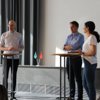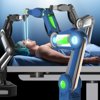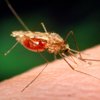Fritextsökning
Artiklar per år
Innehållstyper
-

The first drugs to slow down Alzheimer’s – but what does it mean for patients?
New treatments for early Alzheimer’s are bringing hope to thousands of patients and their families. The question is, who will get the treatment, how will the right patients be found in time, and will the healthcare system’s resources be sufficient? Life Science Sweden has spoken to Swedish researchers in Alzheimer’s who voice cautious hope but also see further challenges.
-

Charlotta Gummeson leaves Sahlgrenska Science Park – “It feels sad and exciting at the same time”
With mixed emotions, Charlotta Gummeson will leave her position as CEO of Sahlgrenska Science Park in October. “It feels sad and exciting at the same time. I’ve been in the thick of things and part of the development for so long now, but I’m also looking forward and thinking about all the new things that there will be in a freer role,” she says to Life Science Sweden
-

Astra Zeneca’s Sweden CEO: “We have great faith in our portfolio”
It all started with a summer job as an operator at Astra’s chemical factory in Snäckviken, just outside Södertälje. More than three decades and countless different assignments later, Per Alfredsson, born and raised in Södertälje, is CEO of Astra Zeneca Sweden, which employs 7800 people in Södertälje, Stockholm and Gothenburg. “It was a very special feeling to be in charge of the entire organisation,” he says in an interview about his career and potential future blockbusters.
-

Novo Nordisk gör AI-satsning inom kardiovaskulära sjukdomar
Novo Nordisk förvärvar rättigheterna till ett flertal prekliniska program från amerikanska Valo, ett företag med expertis inom AI-driven läkemedelsutveckling.
-

19 medicines in Sweden are under investigation in a major EMA inquiry
19 medicines marketed in Sweden are affected by an ongoing extensive European investigation into suspected fraud at an Indian contract research organisation. Among them are medicines for HIV, epilepsy, cancer and Parkinson’s, which may be withdrawn unless new evidence can be provided that they are up to standard.
-

Läkemedelsverket publicerar vägledning om AI inom sjukvården
Läkemedelsverket har för första gången publicerat en vägledning gällande användandet av artificiell intelligens i den svenska sjukvården.
-

”AI kommer inte ha den inverkan som folk kanske förväntar sig”
Är sjukvården och life science-sektorn redo för artificiell intelligens? Det diskuterades på mötet The Future of Swedish & Danish Life Science i Lund under torsdagen.
-

Mycket stort intresse för life science-möte i Lund
Idag, torsdag, pågår eventet The Future of Swedish & Danish Life Science i Lund för över 500 deltagare.
-

Dynamic Code köper konkursat bolag
Diagnostikföretaget Dynamic Code förvärvar Findout Diagnostics som i juli försattes i konkurs.
-

Here are the pharmaceutical companies best prepared for AI
How well prepared are pharmaceutical companies in the field of artificial intelligence? That is what a new analysis has tried to evaluate.
-

Här är läkemedelsföretagen som är bäst förberedda på AI
Hur väl förberedda är läkemedelsföretag inom området artificiell intelligens? Det framgår av en ny utvärdering.
-

Pia Renaudin ny vd på Scibase
Medicinteknikbolaget Scibase, som utvecklar AI-lösningar för hudsjukdomar, har utsett Pia Renaudin till ny vd och koncernchef.
-

Small robots to deliver pharmaceuticals to the body
Robots that can operate inside the body and a platform that combines ultrasound with AI. These are a couple of the technologies that have qualified for a list that aims to promote sustainable entrepreneurship.
-

Här är life science-företagen på Norrskens lista – ”Ett Nobelpris för entreprenörer”
Små robotar som levererar läkemedel till olika delar av kroppen. Det är ett av projekten som är med på Norrskens Impact 100-lista.
-

CROs in drug development: "We use our expertise to speed up the process
Consultancy firms have become an increasingly important part of drug development. “It’s a trend and a business model that works, and we see no indication that it will change,” says Helena Lüning of the industry organisation ASCRO.
-

AI-stödd mammografi hittade fler cancerfall i studie
Screening med hjälp av AI hittade fler bröstcancerfall och minskade arbetsbördan kraftigt jämfört med sedvanlig röntgengranskning av två radiologer i en studie från Lunds universitet.
-

Branschen på plats i Almedalen
Idag är Almedalsveckan inne på sin näst sista dag. Flera aktörer är på plats i Visby för att diskutera hälso- och sjukvård, life science och medicinteknik. Under torsdagen gick regeringen bland annat ut med att en översyn av Folkhälsomyndigheten ska genomföras.
-

Glad sommar! – och chefredaktörens lästips
Life Science Swedens chefredaktör sammanfattar året hittills och ger lästips inför sommaren.
-

Lucy Robertshaw: Artificial intelligence – is this really going to transform a patient’s life?
In a column Lucy Robertshaw reflects on how AI and new regulations will affect healthcare, innovation and the lives of future patients.
-

Rapid developments in AI – “All stakeholders are struggling to understand it”
Artificial intelligence is being discussed more and more, and developments in the field are moving rapidly. As the Swedish Medical Products Agency testifies, keeping up with developments is not easy.
-

15 framtidsyrken inom life science: “Huggsexa om kompetens”
Arbetsmarknaden för naturvetare som jobbar med life science har mycket goda framtidsutsikter. Det visar en ny rapport från fackförbundet Naturvetarna.
-

A new malaria vaccine offers hope but much more research is still needed
There has long been no vaccine against malaria, but there have been breakthroughs in recent years. However, it is still unclear how we become immune to the malaria parasite, and this is a vital piece of the puzzle for creating effective vaccines, says malaria researcher Kristina Persson.
-

Study: Chat GPT is more empathetic than doctors
The AI tool Chat GPT is not only more accurate when it comes to answering patient questions – the chatbot is also perceived as almost 10 times more empathetic than real doctors, a new study reveals.
-

Antikroppar tog form med hjälp av artificiell intelligens
Språkmodeller, såsom Chat GPT, som bygger på artificiell intelligens kan användas till en rad olika saker. Nu har forskare, med en språkmodell tillverkad av ett välkänt amerikanskt företag, i en ny studie kunnat designa antikroppar, rapporterar Nature.